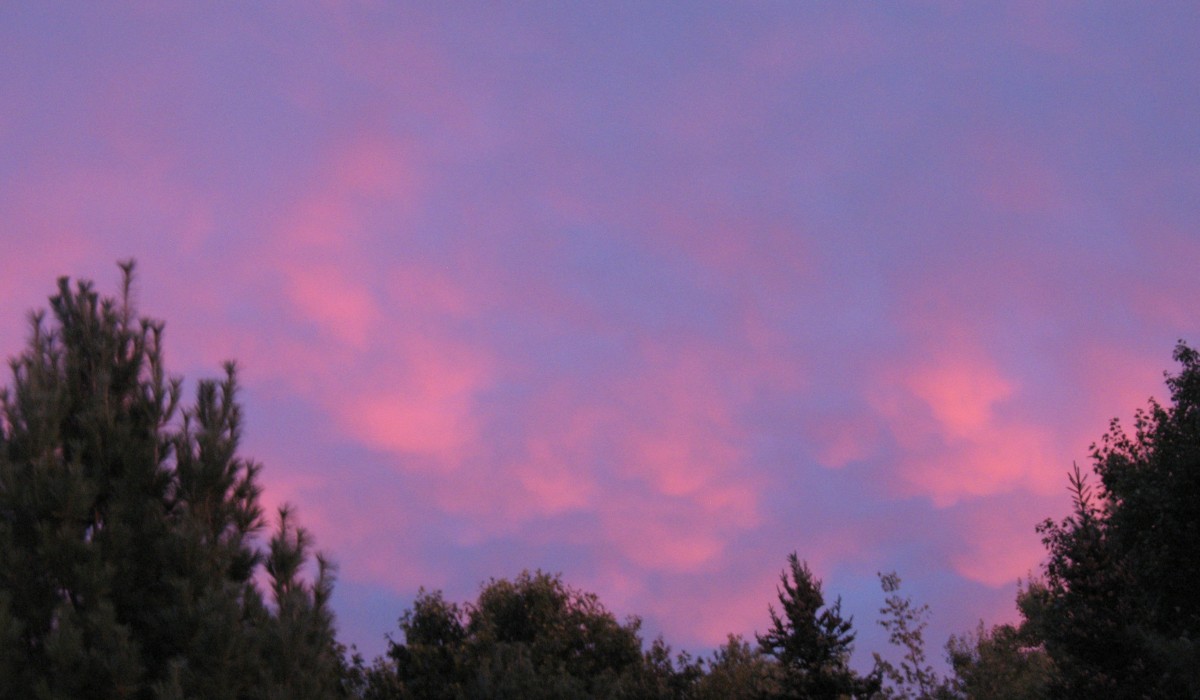by Kate Dernocoeur, guest blogger
With the sky as my ceiling, I am happiest, because it means I am outdoors, immersed in the day, whatever the weather. The air is fresh. I can hear the birdsong and frogs, feel the breeze, smell the earth. When the clouds are backdropped by blue—that’s my favorite. But honestly, even rainy days with their hovering drippy clouds are fine, too.
The sky! Whatever it offers when I raise my eyes to it, I feel gratitude for the chance to be present. The sky joins me to loved ones far away, even across oceans. It is a cap we share. It connects us all. Clouds are the curtains to the sky. They present themselves in many shapes and sizes, many colors. How is it possible not to love clouds?
I started collecting photos of clouds before I learned about Alfred Stieglitz’s body of work on clouds, consisting of several hundred photos, called “The Equivalents.” Stieglitz was my age (58) in 1922 when he started photographing clouds. His images show mostly the ethereal image of vapors in the sky, wispy and patterned, on the theory that such abstract forms, lines, and colors could be the equivalence of corresponding inner states, emotions and ideas. This approach disrupted the late 19th/early 20th century status quo view of art—until then mostly straightforward and realistic.
Thus the Equivalents series was rather controversial. In 1923, Stieglitz wrote in “How I Came to Photograph Clouds” that, “I wanted to photograph clouds to find out what I had learned in 40 years about photography. Through clouds to put down my philosophy of life—to show that my photographs were not due to subject matter—not to special trees, or faces, or interiors… [C]louds were there for everyone—no tax as yet on them—free.” This juicy twist in the design of an image rejects the notion that a photograph is only good for depicting reality. Thus, Stieglitz creates the concept of “photograph as metaphor,” as a tool for contemplation that transcends the image itself.
In an attempt to explain this, Minor White (himself a renowned photographer) wrote in 1963 that people see what they will in an image, but not necessarily what the photographer believes is being shown. “Our usual tendency, if we make the attempt to engage, rather than reject, the ambiguous rendering of a subject in a photograph, is to invent a subject for it,” he wrote. “…If the viewer engages the images at all, then the viewer will see something of himself. If what he sees is unpleasant,…there may be some truth in that some part of himself is unpleasant… If he is struck with terror, perhaps he has met something worthy of his fear. If he finds something magnificent, it is because something beautiful in him has been magnified.”
The implicit design of clouds is constantly in flux, as is life. I admire the vastness of clouds, and the eternity they curtain. I cannot help but record them. Clouds magnify me.
Kate (and friend), shown here after their ride, spent a recent day galloping under the clouds of a lovely (if very windy and cold) spring day in Michigan.













Comments
8 CommentsKory M Shrum
Apr 23, 2012Beautifully said, Kate! I love the parallel between clouds and the fluidity of human emotion. Thanks for sharing! 🙂
Margaret
Apr 24, 2012Kate, I love this…so descriptive and lovely. Your words at the end about the clouds “magnifying” you drew me in. Well done!
Peggydepersia
Apr 24, 2012Beautifully written. Though I have long been familiar with the relationship of Georgia O’Keefe to Alfred Stieglitz and the relationship of Georgia O’Keefe to clouds…think of her paintings of clouds from her beloved southwest. How I missed the relationship between clouds and Stieglitz is beyond me. Now I am curious. What did these lovers share that manifests itself in their artistic representations of clouds…could it be just a coincidence?
Jan
Apr 25, 2012Kate, I was transported and grounded at the same time by cloud visions you presented and the ones I imagined. Jan
Julie
May 1, 2012Thank you Susan, Kate’s photos are just gorgeous.
Susan
May 1, 2012I love her writing too. Agree? I truly appreciate having Kate contribute to Design Destinations.
Phytoceramides
Jun 13, 2014I believe that is among the so much vital information for me.
And i am happy reading your article. But should remark on few common things, The web site taste is
wonderful, the articles is really nice : D. Excellent process, cheers
Brooks Merchen
Nov 4, 2015I’m extremely impressed with your writing skills and also with the layout on your weblog. Is this a paid theme or did you customize it yourself? Either way keep up the excellent quality writing, it’s rare to see a great blog like this one these days..